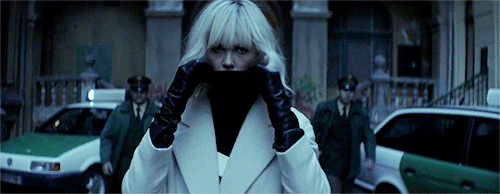
Good goddamn, Atomic Blonde was something else. Â With Charlize Theron as an unreliable narrator and James McAvoy as good-guy douchebag-gone-native this may be in my top-ten favorite cold-war spy films ever. Â It’s a “genre” film, make no mistake about that, but if you have ever been a fan of ’70’s/80’s spy fiction, this is going to be right in your wheelhouse.
I grew up during the cold war. Â I was probably in 4th grade when it finally hit home that if the PTB’s pissing matches ever went past the point of no return, I was going to be one of the lucky ones who was vaporized on impact. Â It was… unsettling at the time. Â When your formative years involve regular reminders that all it would take was a bad transistor, or a flock of pigeons, or a bright red balloon in the wrong airspace at the wrong time, to end the world as you know it, you’re looking at a certain embrace of your inevitable radiation-fueled disintegration.
On older family member once remarked that my generation had no fear.  That the comfort and security of a regular paycheck and well-defined working hours didn’t seem to hold as much attraction for us.  But when you grow up with the complete destruction of humanity as a very possible outcome before you even make it out of puberty, what the hell else can they do to you?  This sense that, we’re all just shuttling around behind the scenes while the facades of our major players keep shouting rhetoric at each other onscreen is one of the key drivers in this film.  While posturing is going on, there is “real work” being done behind the scenes and that idea is one of the most attractive things about the cold war genre. There are people out there taking actual actions.  Not superheroes, not billionaire playboys, just someone who has a job to do.  Anyone can save the world.  They just have to be in the right place at the right time.
For me, there were a lot of things to love about Atomic Blonde. Â Charlize Theron absolutely makes you believe that she is physically capable of pulling off every one of those moves. Â They do the Actor the service (and, yes, this is a service) of allowing her character to get bruised, spit blood, stomp around town in a stylish coat and a black eye. Â They (and likely Ms. Theron bought into this) are not interested in keeping her “pretty”. Â None of this is “pretty”, none of it is glorified. Â It is death, betrayal and mayhem on an intimate, fingernail-peeling, scale. Â The fight scenes are gorgeous and brutal in a way that has only recently become fashionable. Â They make every single hit hard work for both Lorraine (Theron) and her opponents. Â These fights are first and foremost about endurance. Â Who can get up again the quickest.
The story itself, the narrative that strings all of these fight sequences together is incomplete, but not for the reasons you might thing. Â This film was written and filmed for us “Cold War kids”. Â This means there is a lot of “generational canon” here that, unless your own memories of the cold war get brought to the fore by the sound and imagery, you’re going to miss. Â If anything, the filmmakers are guilty of going too far into “show, don’t tell” land. The current crop of 20-something moviegoers simply aren’t going to have all the references to hand. Â (I’m reminded of when The Two Jakes, the 1990 sequel to the 1974 Chinatown was released. Â After 16 years, the experience base of the moviegoers had changed and the new generation just didn’t respond quite as strongly as their parents).
Atomic Blonde reads very much like the plot of so many post WW2 and early cold war spy films, gems like Enigma where the feeling of an operative working in informational darkness is only enhanced by the viewer being kept in the darkness alongside them. Â This was standard fare in many stories of the time. If you are a fan of the genre, Atomic Blonde will fit right in there alongside the original Bourne Identity or Flight of the Condor.




